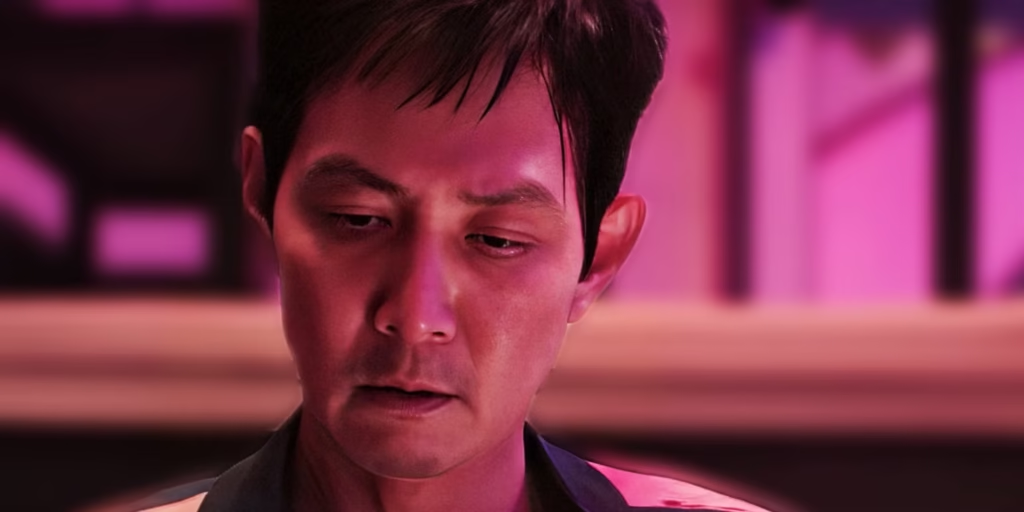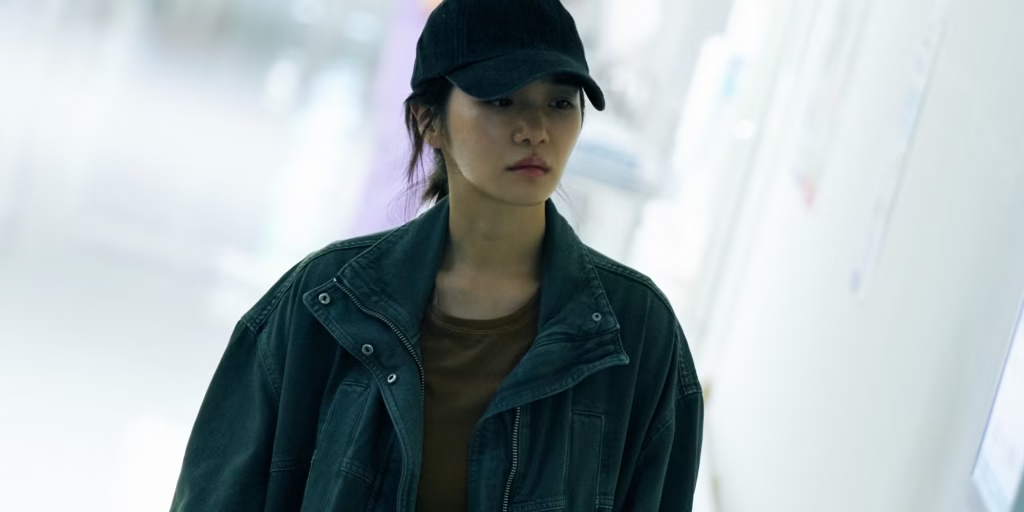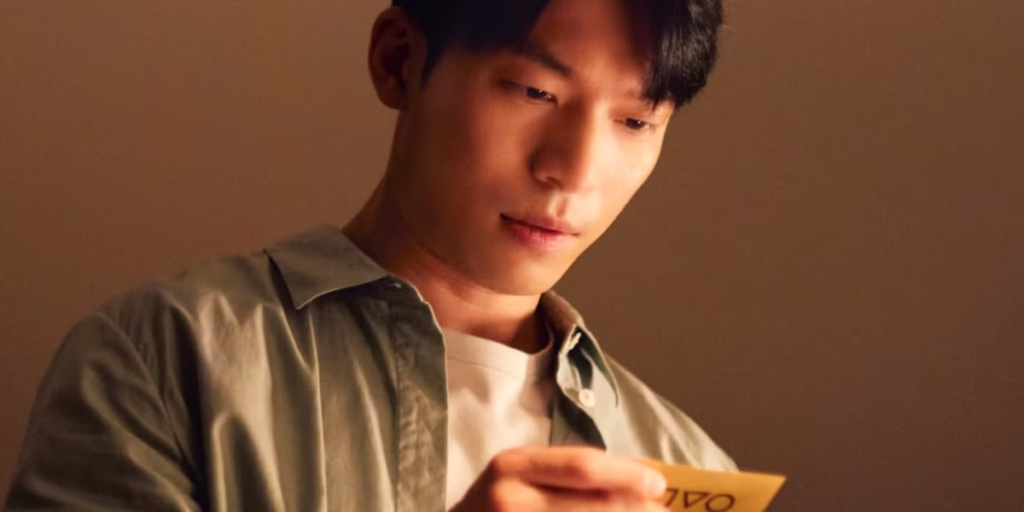A Finale Soaked in Blood and Irony
The third and final season of Netflix’s global hit Squid Game has dropped — and it’s everything you feared and maybe didn’t want. Released on June 27, Season 3 wrapped up the dystopian horror series with six relentless episodes, plunging viewers into the grim final chapters of the Games. And while it ends, it also leaves the door cracked open — wide enough for a spin-off, a sequel, or simply the haunting realization: the Games never really end.
Gi-hun’s Last Stand: Hero or Martyr?

In a stomach-turning finale, protagonist Seong Gi-hun (Lee Jung-jae) finds himself in a final round against a newborn baby — Player 222 — and the baby’s morally bankrupt father, Myung-gi. After Myung-gi falls to his death, Gi-hun is left with a cruel choice: kill the child or be executed by the Game’s enforcers. Defiantly, Gi-hun chooses to end his own life, refusing to be the horse the VIPs bet on. His death is tragic, but also a final act of rebellion.
No-eul and Jun-ho: Redemption, Escape, and Loss

While Gi-hun’s death is the emotional climax, there’s another escape unfolding. No-eul (Park Gyu-young) helps Jun-ho (Wi Ha-jun) flee the island just as the Front Man, In-ho (Lee Byung-hun), sets a self-destruct timer. No-eul almost stays behind to die with the records, but Gi-hun’s sacrifice changes her mind. She leaves, burning documents behind her, and possibly guilt too.
Six Months Later: Fallout and False Closure

Half a year passes. Jun-ho gets Jun-hee’s baby and her blood money prize. No-eul gets a lead on her daughter in North Korea. Gi-hun’s daughter receives a box with his bloodied uniform and a reloaded debit card — a grim inheritance from a father who wanted to end the system that ultimately claimed him.

Cate Blanchett? The U.S. Spin-Off Tease

In the final seconds, viewers are smacked with a stinger that has everyone talking: In-ho watches as Cate Blanchett, suited up as a recruiter, slaps an American man in a grimy L.A. alley. Ddakji has gone global. The implication? A potential U.S. version of Squid Game. Is this a narrative device showing the system’s inescapability, or a real teaser for Netflix’s next big franchise play?
From Class Commentary to Content Machine
While Season 1 was heralded for its sharp anti-capitalist message, Seasons 2 and 3 shift tone. Critics argue the soul of Squid Game has been replaced with action for action’s sake — spectacle instead of message. What began as a dark mirror of economic inequality ends as a stage for Netflix’s IP expansion.
But maybe that is the message. Maybe the real horror isn’t death games — it’s how quickly society adapts to them.
Gi-hun’s Final Choice: Death Over Dehumanization

In the climactic final game of Squid Game Season 3, protagonist Gi-hun (Lee Jung-jae) is forced into an impossible moral dilemma: survive by killing a newborn baby—or die. The baby’s father, Myung-gi, has already demonstrated his willingness to risk his own child’s life for victory, but fate intervenes when he falls to his death before the game begins. This leaves Gi-hun alone with the baby and a haunting decision to make. In a defiant, deeply human act, he kills himself rather than participate in the barbarity. “I am not a horse to be bet on,” he says, rejecting the dehumanizing system. With that, Player 456 is eliminated—but his humanity is preserved.
The VIPs Watch, Unchanged and Untouched

Meanwhile, the elite VIPs—observers of this twisted blood sport—watch without blinking. Their opera glasses and champagne serve as chilling reminders of the class divide and the show’s core message: the rich consume suffering as entertainment. Even as Gi-hun defies the system, nothing changes for them. They remain untouched, unaffected, and likely to repeat the cycle. In the world of Squid Game, the system protects its architects.
No-eul’s Redemption Arc and the Fight to Save Others

No-eul (Park Gyu-young), one of the game workers with a complicated past and lingering guilt, plays a crucial role in the finale. Her actions—helping Jun-ho escape, choosing to destroy incriminating records, and ultimately saving herself—represent one of the few arcs in the show that suggest redemption is possible. After witnessing Gi-hun’s sacrifice, she refuses to die pointlessly and evacuates the island with other workers. Her decision marks a rare moment of individual growth in a show built on despair.
Jun-ho’s Return and the Mysterious Survival of Jun-hee’s Baby

Detective Jun-ho (Wi Ha-jun) finally returns after seasons of searching, arriving just in time to see the island set to self-destruct. He flees with No-eul, but his story doesn’t end there. Months later, he gives up his job and investigation—until the Front Man, his own brother In-ho, delivers to him the newborn daughter of Jun-hee, along with her massive 45.6 billion-won prize. It’s a chilling full-circle moment: the baby survived, but at what cost? Who’s been taking care of her? And is she now merely a symbol in the game’s ongoing propaganda?
Post-Game Lives: Closure or Illusion?

Six months after the island’s destruction, characters attempt to return to normal life—but normal no longer exists. Mr. Choi, the crooked loan shark, is out of prison. No-eul is helping a man she saved from the Games, and even gets a lead on her own daughter’s whereabouts in North Korea. There’s a sense of closure, yes, but it’s fragile. The psychological wounds—and the political message—linger like smoke from the island’s ruins.
A New Recruiter Appears… and It’s Cate Blanchett?

Just when it seems the nightmare is over, Squid Game delivers a jaw-dropping final twist. As In-ho (the Front Man) drives through Los Angeles, he witnesses a familiar slapping sound echoing from a dark alley. There, an American man is being recruited into the Games with a red and blue envelope—and the recruiter is none other than Cate Blanchett in a surprise cameo. She exchanges a chilling, knowing glance with In-ho before returning to her game. The message is clear: the Games aren’t over. They’ve just gone global.
The Games Go Global: Squid Game USA?
Blanchett’s appearance is more than just a celebrity cameo. It opens the door for what could be Squid Game: America—a potential Netflix spinoff that mirrors the global nature of exploitation and class struggle. The scene doesn’t just imply that the Games continue in South Korea—it confirms they’ve expanded to the U.S. Whether this is a critique of American capitalism or a setup for the next franchise phase, it leaves viewers reeling with possibility.
Capitalism, Violence, and the Never-Ending Cycle
The ending reinforces the show’s core thesis: the systems of inequality and exploitation are not just entrenched—they are borderless, adaptable, and resilient. Gi-hun’s sacrifice, while noble, changed nothing. The VIPs are still thriving. The Games are still recruiting. Wealth, cruelty, and power remain inseparable. And just like in real life, individual rebellion may inspire—but it rarely dismantles the machine.
The Legacy of Squid Game: A Story That Echoes
From its explosive first season to its controversial final act, Squid Game has sparked global conversation about morality, inequality, and the dark heart of entertainment. While many fans feel the last two seasons lacked the tight writing and impact of Season 1, the series still concludes with an unforgettable bang. Its cultural legacy is already cemented—and its narrative world may not be done expanding.
Final Thoughts: An Ending or a New Beginning?

Squid Game ends where it began: with pain, spectacle, and haunting questions about humanity. Gi-hun’s journey ends with dignity, but the system he fought against lives on. And as long as the world hungers for thrill, spectacle, and power, the Games will continue—on-screen and off.
Maybe you also like:
Follow me on:
For more updates, visit: flashpointnews.com.br



